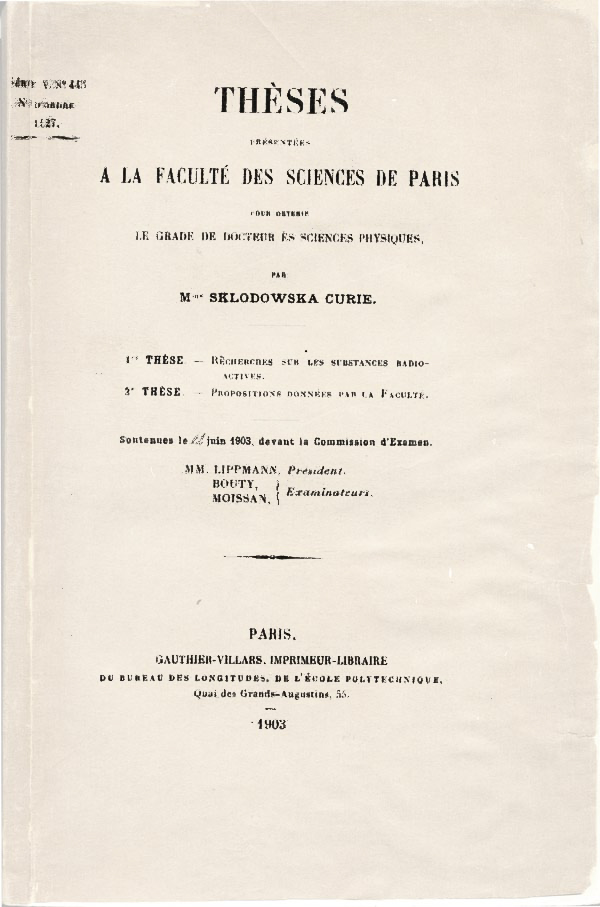
For her groundbreaking research on radioactivity, Marie Curie won the Nobel Prize. Or rather, she won two, one for physics and another for chemistry, making her the only Nobel Laureate in more than one science. What’s more, her first Nobel came in 1903, the very same year she completed her PhD thesis at the Sorbonne. In Recherches sur les substances radioactives (or Research on Radioactive Substances), Curie “talks about the discovery of the new elements radium and polonium, and also describes how she gained one of the first understandings of the new physical phenomenon of radioactivity.”
So says science Youtuber Toby Hendy in the introduction below to Curie’s thesis–a thesis that made her the first woman in France to receive a doctoral degree in physics. “Following on from the discovery of X‑rays by Wilhelm Roentgen in 1895 and Henri Becquerel’s discovery that uranium salts emitted similar penetration properties,” says The Document Centre, Curie “investigated uranium rays as a starting point, but in the process discovered that the air around uranium rays is made to conduct electricity.”
Her deduction that “the process was caused by properties of the atoms themselves” — a revolutionary finding that overturned previously held notions in physics — led her eventually to discover radium and polonium, which would get her that second Nobel in 1911.
Unlike her Nobel Prize in physics, which she shared with her husband Pierre and the physicist Henri Becquerel, Marie Curie won her Nobel Prize in chemistry alone. By 1911 Pierre had been dead for half a decade, but Marie’s scientific genius couldn’t be stopped from continuing their pioneering research as far as she could take it in her own lifetime. She clearly knew how vast a field her work, with and without her husband, had opened up: “Our researches upon the new radio-active bodies have given rise to a scientific movement,” she writes at the end of Recherches sur les substances radioactives. That movement continues to make discoveries more than a century later — and her original thesis itself remains radioactive.
Related content:
An Animated Introduction to the Life & Work of Marie Curie, the First Female Nobel Laureate
Marie Curie Invented Mobile X‑Ray Units to Help Save Wounded Soldiers in World War I
Marie Curie’s Research Papers Are Still Radioactive 100+ Years Later
Based in Seoul, Colin Marshall writes and broadcasts on cities, language, and culture. His projects include the Substack newsletter Books on Cities, the book The Stateless City: a Walk through 21st-Century Los Angeles and the video series The City in Cinema. Follow him on Twitter at @colinmarshall, on Facebook, or on Instagram.


She was Maria Sklodowska Curie (as on the PhD thesis cover)
Most inspiring is Madam Curie. Her husband Pierre was a baack bone and enabled her to process tons of radioactive soil to identify and isolate radium and polonium. A rare and courageous woman of her era who had educated against the wish of society and continued to pursue research with her husband to share Nobel prize with Bacqerel and Pierre and her PhD on radioactive substances in 1903 and later one Moore Nobel prize in chemistry in 1911 without the previous support of Pierre. She had a daughter who had won noble prize and an another daughter a celebrated writer. A unique family through Curie. Long live her memory inspiring generations to come. A privilege to say I did little work on the area she worked hard and left everlasting knowledge.
Very nice your work about Madame Curie, a symbol of real scientist dedicated to the help the mankind.
Please let me know wereI can find the Madame Curie theses, english version
Thanks
G. Gandra
gg*****@***oo.com